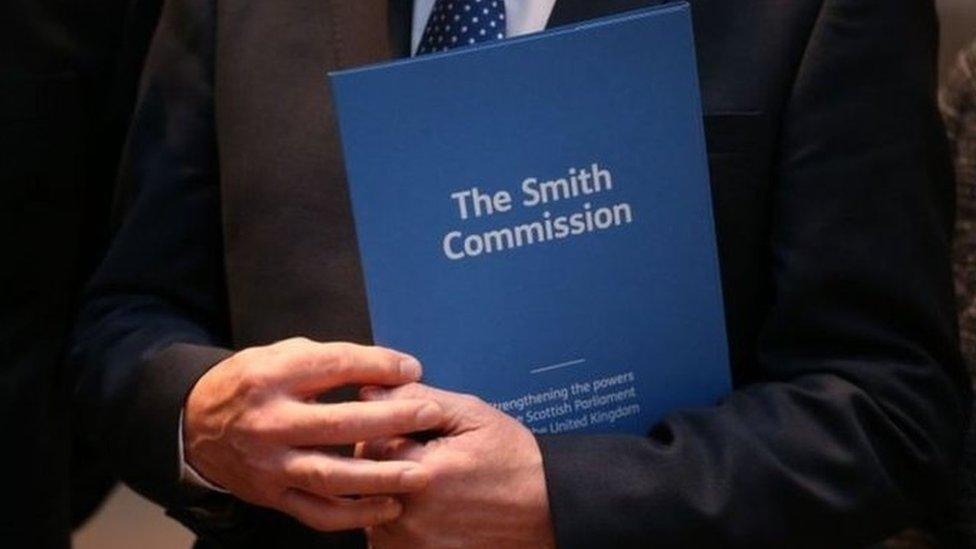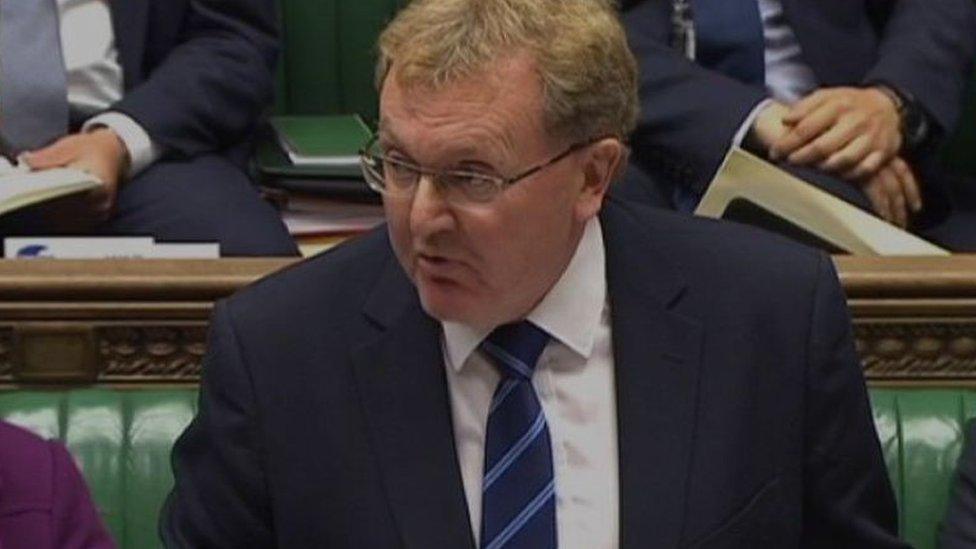Intriguing difference of opinion over Scotland Bill
- Published

An intriguing difference of opinion tonight anent the further amendments to the Scotland Bill, which have been put forward by the Scottish Secretary David Mundell.
Mr Mundell says that the amendments clarify the bill and provide an assurance that the provisions of the cross-party Smith Commission have been translated into legislation. This, he adds, will be the case for all reasonable people taking a reasonable view.
So what is the response? For the Conservatives, Alex Johnstone - who sits on the Holyrood committee considering the bill - says "no one can now be in any doubt" that Smith has been delivered.
Well, guess what, some can. Bruce Crawford who chairs that committee says the amendments will be scrutinised in detail.
But, speaking for himself as an SNP MSP, he says there are still "some gaps in regard to welfare vetoes, devolution of all the employment provisions called for by Smith and on the permanency of the Scottish Parliament."
The real divergence occurs, however, when we turn to opinions voiced by the Scottish government and the Labour Party.

David Mundell says the amendments clarify the bill
Finance Secretary John Swinney is adamant that the bill still falls short. In particular, he says there is still "an effective veto" which could be exercised by the UK government over the implementation of newly-devolved elements of Universal Credit.
In essence, this rests as it has from the outset upon an interpretation of the requirement for the DWP to be consulted over the practical implementation of any changes to UC which the Scottish government might propose, once the powers are available.
Mr Mundell notes that: "A co-operative approach between the UK and Scottish Governments will be essential and amendments will clarify the Secretary of State's role in agreeing to Universal Credit regulations that can be laid by Scottish Ministers."
The Scottish secretary says this is purely pragmatic. Scottish ministers continue to voice concerns that pragmatism could slip into obstruction. At its core lies a more fundamental difference in approach towards the continuation of a role for the UK government in Scottish affairs.
And Labour's approach? It emerged over the weekend at the Scottish Labour conference in Perth. There was an evident and overt drive to shift the debate away from the content of the Scotland Bill to the potential deployment of the powers contained therein.

John Swinney is adamant the bill falls short of the Smith Commission recommendations
That was the approach broadly adopted by both Kezia Dugdale, the Scottish party leader, and Ian Murray, Labour's sole MP from Scotland and shadow Scottish secretary. As I noted at the time, they were not abandoning the task of altering the bill - but their mindset was quite obviously post-legislative.
This is, of course, driven by politics as well as a pragmatic recognition of the Conservative Westminster majority. Labour wants to get off the constitution and get onto challenging the SNP over tax and spending powers: most notably with Ms Dugdale's offer to fund the restoration of tax credits in Scotland with taxation drawn from middle and upper earners.
Within this initiative, there has now been a significant intervention by the former prime minister Gordon Brown. He previously castigated the bill as falling short - and his views in that regard were regularly cited by the SNP.
Further divergence
Now he says that the 100 or so amendments tabled to the bill have resulted from Labour pressure - and mean that the bill delivers the Vow (which he orchestrated). He argues that it is now time to move from talking about the powers to discussing how they might be implemented.
Self-evidently, this fits the pattern emerging from Labour over the weekend. Labour strategists say - on Universal Credit - that it is reasonable to consult the DWP on the practical operation of benefits payments, even after partial devolution.
Mr Swinney remains suspicious - but may have to settle, in practice, for the latest form of the bill as set out by Mr Mundell.
Quite separately, of course, there is a substantial inter-governmental discussion about the fiscal framework which will accompany the bill.
In this regard, I note that Mr Mundell's earlier enthusiasm for a speedy deal seems to have encountered the reality of the scope of these talks. He now says it should be completed after the Spending Statement by the chancellor and the subsequent Draft Budget from Mr Swinney.
That could push the issue to the end of this year or early next.
There is more negotiation to take place. However, I expect agreement.
At that point, there will be further divergence still among the various parties: about the long-term salience of the package and how the powers should best be implemented.